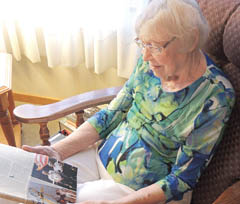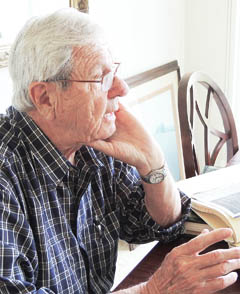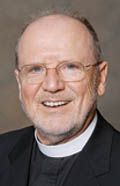


Alleluia!
A one word headline from The Observer July 12, 1985, announced the return of religious pilgrims from the Rockford Diocese after 17 days in captivity at the hands of Hezbollah terrorists.
Thirty years after the hijacking of TWA flight 847, former hostages say this crisis shaped, deepened and revitalized their Catholic faith. (See the Jan. 9 issue for “Faith Sustains,” another story about the hijacking.)
About 45 of the 139 passengers on flight 847 were part of a diocesan group that had recently toured the Holy Land. Parishioners from St. Peter Parish in Geneva and their pastor, Msgr. James McLoughlin, parishioners from St. Margaret Mary Parish in Algonquin and their pastor, Msgr. P. William McDonnell, were joined by Msgr. Thomas Dempsey, who was the pastor of St. Patrick Parish in St. Charles.
|
Msgr. McDonnell Traveling Again
Because Msgr. P. William McDonnell, now retired, is preparing to begin service as a spiritual director at North American College in Rome, The But Dr. Owen Phelps, retired diocesan communications director and former editor of The Observer covered the story in 1985. He describes Msgr. McDonnell’s heartfelt remarks at a Sunday Mass on July 7, 1985. ““The Gospel was the story of Jesus and the Apostles in a boat during a storm,” Dr. Phelps said. “Msgr. Bill started his homily noting how he had been on the shores of that sea only a few days before. “He seemed to perfectly hit all the right notes — notes of deliverance and gratitude, notes of uncertainty and dread over the remaining hostages, some of them his personal friends. He concluded with a moving expression of Christian hope for deliverance,” Dr. Phelps continued. “The homecoming had begun.” —Lynne Conner |
When the aircraft was forced to land in Beirut, Lebanon, 39 male passengers including Msgr. McLoughlin, Msgr. Dempsey and Deacon Raymond Johnson were taken off the plane and into the city where they were separated and held at various locations for 17 days. On June 30, 1985, the group was released and allowed to return to the United States by early July.
Al Johnson, an accountant and member of St. Bridget Parish in Loves Park, was just weeks away from his wedding when he got the news that his parents, Deacon Raymond and Margaret Johnson, of Annunciation of the Blessed Virgin Mary Parish in Aurora, were among the hostages.
“At one point, my brother Joseph got a phone call from my father who told him, ‘All the plans for the wedding are to go on, no matter what.’” Deacon Johnson was to preside at his son’s marriage ceremony on July 6.
“Living through this horrendous time really cemented some family members’ relationship with the Lord,” Al said. “Our family has come to know the joy of family relationships to a much greater extent because of the emptiness we would have known if we had lost our parents.”
At the age of 90, Margaret Johnson of Aurora still vividly recalls the events surrounding the hijacking. “I thought, ‘The only thing that’s going to get us out of this is God.’
“All through this terrible experience, I was praying,” Margaret said. “All I could do was pray, ‘Jesus, help me; Jesus help us.’ Prayer was what got us out of this horrible situation. It was all the prayers of the hostages and all the prayers of the people back home in our churches. To this day, I’m convinced that’s what saved us.”
Margaret agrees with her son. “This experience really stressed to us how important family is. Tell your children and spouse that you love them; make a point to say it so they will all know it.”
Msgrs. McLoughlin and Dempsey also credit to the power of prayer all the graces they felt through their captivity and for their survival.
“Certainly we all prayed,” Msgr. Dempsey said. “This was either the end of our lives or somehow we might get free.”
“I think that things happen for a purpose,” Msgr. McLoughlin, also retired, said. “For me, I had wonderful spiritual experience at the time this happened and I felt very close to the Lord … I experienced His presence, peace and power all through this ordeal.”
While in Beirut, “We prayed every day publicly,” Msgr. Dempsey said. “We made up scriptural services and each of the guys in our group would read from the Bible or say a prayer. … Because they (the terrorists) did their prayers in front of us, we always ended our prayers by standing up and saying the Our Father.”
With a Bible borrowed from Deacon Johnson, Msgr. Dempsey said that preparing for the daily prayer group helped to keep everyone’s focus on hope and survival.
“The affirming thing about our prayer group was that even if I didn’t prepare something, the others would say, ‘Come on, Tom, how about our prayer service?’ So then I would put something together and we prayed every day.”
Adjusting to life after the hostage ordeal was different for Msgr. McLoughlin than it was for Msgr. Dempsey.
“Coming home was exciting at first, but then I started to notice that I was tired in the morning when I woke up after a full night’s sleep,” Msgr. McLoughlin said. “I knew that could be a sign of depression, so I got counseling from a priest in Chicago who was doing a study on post-trauma syndrome.”
Msgr. Dempsey viewed his re-entry into parish life as a chance to pick up where he had left off.
“I was just happy to be home. It was wonderful that it was
over,” he said. “I just wanted to move on with life. I was home for a day, went back to the rectory and Father (Stephen) St. Jules walked into my office, looked at me and said, ‘You’re home, you can have your job back, I don’t want it.’”
For his part, Msgr. McLoughlin has spent time since the hijacking learning more about the Middle East.
“I decided to do what I could to further understand why this had happened,” he said. “Through study, night courses and joining an Arab American group, I discovered that the media in this country has a slanted view of the Middle East. I had accepted this view until my experiences in Beirut,” he said.
Msgr. McLoughlin has made several trips back to the Middle East hoping to gain a better understanding of this region, its people and its culture.
Speaking to church and school groups about the hijacking has helped both priests put the experience into perspective. Margaret Johnson and her late husband Raymond have shared their experiences with several church groups, as well.
Time may have helped to fade the emotional trauma flight 847 had on Msgr. McLoughlin, Msgr. Dempsey, Msgr. McDonnell and Margaret Johnson.
Their commitment to the Catholic faith, belief in prayer and personal determination, continue to remain vibrant 30 years after their ordeal. And for that, all that can be said is, Alleluia!














